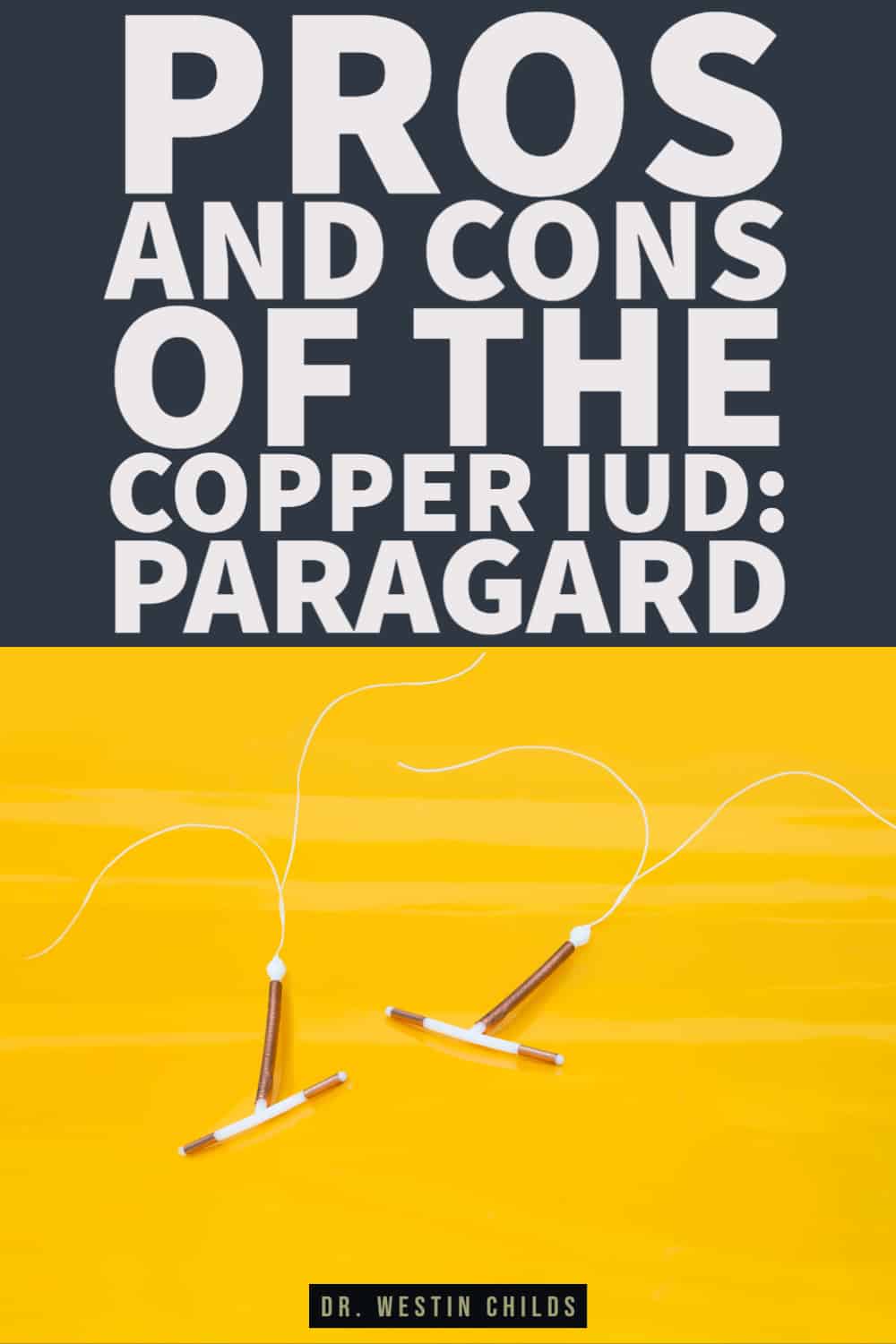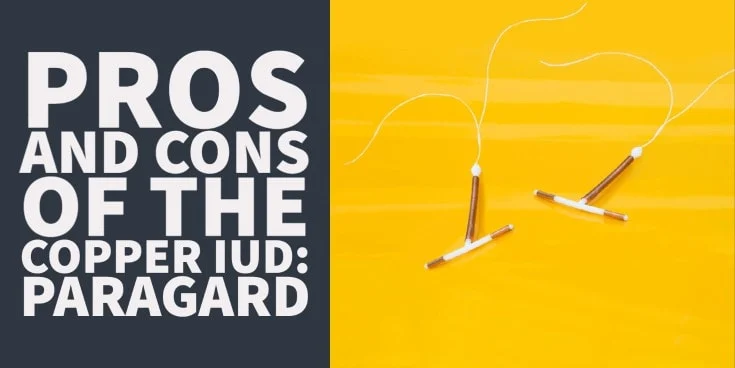Should you use the Copper IUD Over Other Forms of Birth Control?
When it comes to birth control, there are MANY options available.
But how do you know which one you should use?
As someone who frequently manages hormones in women, my recommendation is to pick the form of birth control that impacts your sex hormones the LEAST.
And when we talk about birth control that’s what you should care about the most, your sex hormones.
Hormones like estrogen and progesterone.
These are the hormones responsible for the menstrual cycle, ovulation, and fertility.
If you have issues or problems with these hormones then it will impact your fertility, your ability to ovulate, and your ability to become pregnant.
So most methods of birth control impact these hormones in some way.
Except for the one we are going to talk about today, the copper IUD.
The copper IUD, otherwise known as Paragard (1), is a long-term form of birth control and functions as an IUD.
An IUD stands for intrauterine device.
IUDs are placed inside of the uterus and typically work by blocking implantation thereby reducing/preventing fertility.
The copper IUD is special in that it is the only IUD available that does NOT secrete hormones.
Other IUDs, such as Mirena, function to prevent implantation but also secrete a low level of hormones out at a consistent rate to disrupt estrogen/progesterone balance and interfere with ovulation.
The fact that the copper IUD does NOT do this is a huge benefit to women and it provides some special advantages that other forms of birth control do not.
Due to these beneficial side effects, and many more (which we will talk about shortly), it’s one of my preferred methods of contraception for women.
Pros (Benefits) of the Copper IUD
Before you run out and get the copper IUD you should be aware of both the potential benefits as well as the potential downsides.
Let’s start with the benefits…
#1. It is VERY Effective
Like many forms of birth control, the copper IUD is considered to be VERY effective at preventing pregnancy.
The success rate when using the copper IUD is around 99.4% (2) which puts it on par with most other forms of birth control.
No form is 100% effective at preventing pregnancy but most medical forms of birth control are around the 99% range.
#2. It does NOT Suppress sex hormones
Another huge benefit is the fact that it does NOT suppress your sex hormones (estrogen and progesterone).
Most forms of birth control, especially when we start to talk about birth control pills, have a significant and negative impact on your sex hormones.
They work to block ovulation by completely shutting down the production of native estrogen and progesterone production in your body.
Birth control pills do this by providing your body with fake versions of progesterone and sometimes estrogen.
These fake hormones feedback to your brain and shut down the production of FSH and LH from the pituitary gland.
As you might suspect, this can definitely cause some long-term problems and it should be avoided at all costs!
The copper IUD does NOT do this because it does NOT contain any fake hormones.
#3. It allows your body to still ovulate
Because the copper IUD does not provide your body with synthetic hormones, you will still ovulate each month (provided your sex hormones are in balance).
Ovulation and the impact ovulation has on your sex hormones, are very important for your long-term health.
Ovulation helps to reduce inflammation, regulate immune function, improve metabolic function, and so on.
You WANT your body to ovulate regularly.
I should point out that because you are ovulating it is still possible for fertilization of your egg with sperm but because the IUD is located in the uterus it will prevent the implantation of the fertilized egg.
#4. It allows for quick rebound fertility once you stop using it
In a perfect world, whatever form of contraception would work 100% until you were ready to become pregnant.
In that perfect world, once you stopped taking your preferred form of birth control your body would bounce back and be ready for both ovulation and pregnancy.
But this rarely happens.
In fact, it can take months (sometimes longer, depending on the woman) for fertility to return after discontinuing synthetic hormones.
This does NOT happen with the copper IUD.
Once you have the IUD removed, your body will be ready for pregnancy (3) almost immediately.
This happens because your brain doesn’t have to “restart” and start producing hormones again like it would with other forms of birth control.
The copper IUD allows for much more precise pregnancy planning.
#5. It has the highest satisfaction rate among women who use it
According to user satisfaction scores, Paragard is rated the highest.

This number would probably be much higher if women really understood how damaging synthetic hormones are for their bodies.
#6. Lasts a long time (up to 10 years)
Another big benefit is that the copper IUD not only lasts a long time but it really is a ‘set it and forget it’ kind of birth control.
The copper IUD will remain effective at preventing pregnancy for up to 10 years after insertion!
This does not mean you have to have it inserted for 10 years, though!
Remember:
it can be removed at any point along this timeframe if you desire to try and become pregnant.
Cons of The Copper IUD
While the copper IUD has some amazing benefits, there are also some cons that you should be aware of.
In most cases, these cons do not outweigh the benefits but there are specific scenarios in which it may be preferable to use a hormone-secreting IUD over the copper IUD (these are rare but they do occur).
#1. It may be expensive (cost)
One downside to the copper IUD is the cost.
The copper IUD itself costs around $150 and you may have to pay additional fees for insertion, office visit, medications for the visit, and so on.
When you look at it over the course of 10 years, the cost is minimal, but it may be prohibitive for some people!
Also, be aware that your insurance may not cover it so be sure to ask before you get it inserted.
#2. It’s painful when inserted
IUDs in general are not very comfortable when they are inserted, especially if you’ve never had a baby.
It will require an office visit for insertion and you may want to prepare by taking a pain killer or another anti-inflammatory.
I’ve personally seen some women experience fairly intense cramping after insertion that feels like a pinching pain.
I can’t relate to the pain, but I can tell you from my perspective that it did not look comfortable!
Other women appear to have no issues with the insertion process.
#3. It may cause some copper absorption and interfere with zinc/copper balance
Something you may not think about is that the copper IUD can secrete low levels of copper continuously after insertion.
Because the copper IUD is made of copper and because it’s in contact with your insides (uterus), some of that copper will be absorbed into your system.
Don’t let this freak you out though, because the absorption of copper is very low and shouldn’t cause any serious side effects or issues.
This copper absorption can be mitigated by simply taking a zinc supplement by mouth.
Zinc helps to regulate and balance your copper levels, so if you know you are absorbing more copper than usual, you can balance out this copper with some added zinc.
This copper: zinc imbalance is NOT specific to the copper IUD, though.
Other forms of birth control cause the same issue but through a different mechanism (4).
Synthetic hormones, especially those with estrogen, cause the body to retain copper which can trigger anxiety.
The treatment is still the same, supply your body with more zinc to offset the symptoms.
#4. It increases your risk of bacterial vaginosis and disrupts the vaginal microbiome
The physical presence of an object in the uterus is enough to disrupt the microbiome of the vaginal tract.
This microbiome is important for maintaining the diversity of the bacteria found in the vagina.
Unfortunately, insertion of any IUD (including the copper IUD) is enough to change this microbiome which increases your risk of something called bacterial vaginosis (5).
Bacterial vaginosis is the overgrowth of a specific type of bacteria that can alter the smell of the vagina in an unpleasant way.
It’s easily treated with some antibiotics, though, but you should be aware that your risk of this condition is doubled compared to women who do not have an IUD.
#5. There is a small risk of uterine perforation
This risk applies to all IUDs including the copper IUD.
After insertion of the copper IUD, some women may experience uterine perforation.
Uterine perforation is when the copper IUD literally pokes through the wall of the uterus.
The uterus is a very strong muscle, so when it clamps down, it may cause this perforation to occur.
It’s quite rare, however, and only occurs in about 1 in 1,000 cases.
#6. You Need to See your Doctor for Removal
Lastly, if you want to get your copper IUD removed it will require an office visit.
Some women have been able to remove the device themselves, but it’s not recommended and may increase your risk of complications.
Removal is an easy procedure but you will still have to make it into the office to get it done.
The Bottom Line
When you look at all of the potential benefits and harms that come when using the copper IUD it’s easy to see that it may be one of the best long-term options for birth control available.
There are some rare but serious risks associated with copper IUD insertion but the benefits of not impacting your hormones may be worth that risk.
In some situations, especially in women who suffer from endometriosis, hormone-secreting IUDs may be a better option.
But if you are someone who wants a long-term form of birth control that does not disrupt your hormones or HPO axis, then the copper IUD is probably your best bet.
Now I want to hear from you:
Are you thinking about using the copper IUD as a form of birth control?
Are you currently using the copper IUD? If so, has your experience been positive? If not, why not?
Were you aware of the fact that the copper IUD does not alter your sex hormones?
Leave your questions or comments below!









